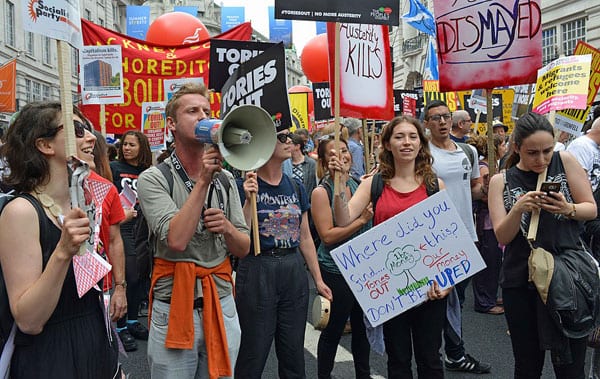
February 24, 2019; New York Times
In 2017, the Labour Party in Great Britain, though falling short of gaining power, made major gains, defying pundit predictions and depriving the Conservatives of a parliamentary majority. That election also “exposed the starkest generation gap in the recent history of British politics. Young voters broke dramatically for the Labour Party, whose socialist leader, Jeremy Corbyn, has promised to rebuild the welfare state and redistribute wealth,” explains Ellen Berry in the New York Times.
While younger voters often tilt left and older voters right, the 2017 British election figures were indeed stunning. Voters between the ages of 18 and 29 cast over 62 percent of their ballots for Labour and less than 23 percent for the Conservative Party. By contrast, voters over the age of 70 cast 69 percent of their ballots for the Conservatives and only 19 percent for Labour.
In her article, Berry profiles 19-year-old student Alex McIntyre, a student who, she says, “gave up on capitalism after a year in college.” While Berry acknowledges that no one person can stand in as representative for a generation, McIntyre’s grievance, Berry underlines, “is generational: that the state has taken away benefits his parents and grandparents enjoyed, like low-cost housing and free education.”
“We’re not blind to it. We’re not stupid, you know,” McIntyre explains, “The reason we’re opposing what’s going on is what we’ve been dealt.”
Berry details some of the indignities that McIntyre experienced growing up:
The youth center where he went after school was shuttered when he was 10. When he was 11, his mother’s housing benefit was shaved away, a casualty of the Welfare Reform Act. By the time the streetlight in his cul-de-sac began blinking off at midnight a few years later, these events had knitted together into a single story, about a government policy that had defined his childhood.
Sign up for our free newsletters
Subscribe to NPQ's newsletters to have our top stories delivered directly to your inbox.
By signing up, you agree to our privacy policy and terms of use, and to receive messages from NPQ and our partners.
Berry also details austerity’s broader effects. “Born on the wrong side of skyrocketing property values,” Berry writes, “30-year-olds are only half as likely to own homes as baby boomers were at the same age. A third are expected to rent for their whole lives.” It gets worse. The average graduate, Berry explains, “now owes the government more than 50,800 pounds, or $64,000.”
There have been broader social impacts as well. Benjamin Mueller notes in a companion Times article that, “The use of food banks almost doubled between 2013 and 2017. Families that receive benefits are now thousands of dollars worse off every year.” And more than 600,000 additional children are estimated to have joined the ranks of those in poverty since 2012.
Robert Ford, a professor of politics at the University of Manchester, observes that, “All the risk has been shifted onto [youth]. They know this is not the situation their parents and grandparents were in. You’ve got a generation since the crisis with lower mobility and lower security. It makes them less convinced that the market delivers good outcomes.”
While the US has not felt the full force of British-style austerity, many of these trends should be quite familiar to US readers. Last July, NPQ noted that “the homeownership rate of Americans aged 25 to 34 is a full eight percentage points less than that of Americans born between 1946 and 1980.” As in Britain, a major cause is mounting debt, with a survey finding that 52 percent of youth identified student loan debt as at least somewhat of an obstacle to buying a home. Three in ten surveyed add that they “knew personally” of someone who has delayed buying a home due to student loan debt. Nationally, US student loan debt now totals $1.53 trillion (and climbing).
Washington Post columnist Michelle Singletary points out that many people “see their student loans as a debt sentence so crushing they can’t see a way out.” Singletary quotes one student who observes that, “My generation is facing an unsustainable system of semi-forced indebtedness that has real consequences on our ability to make significant life purchases.”
In her profile of British austerity, Berry underscores how radically economic precarity has altered the ways that British youth perceive their world. “Austerity, that’s what I know, that’s my life,” McIntyre tells Berry. “I’ve never known an England that was a different way.”—Steve Dubb













